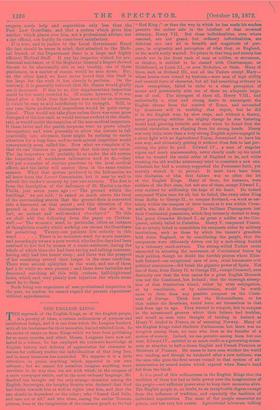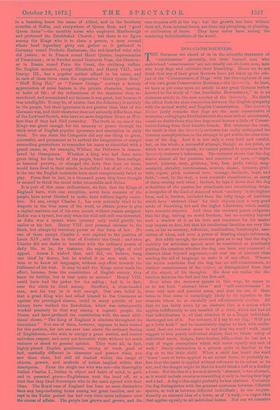THE ENGLISH KINGS.
THE reproach 'of the English Kings, as of the English people, is a poverty of ideas, a certain ordinariness of purpose and intellectual design, and it is one from which Mr. Langton Sanford, with all his tenderness for their memories, has not relieved them. In the series of essays on those Kings which we have been publishing for so many months, and which Messrs. Longman have now col- lected in a volume, he has employed his extensive knowledge of English history and delicacy of appreciation for character to restore for ordinary readers the individualities of that long line, and in many instances has succeeded. We suppose it is a little ridiculous to praise anything which appeared in our own columns ; but we cannot for ourselves imagine anything more excellent in its way than the art with which, in the compass of a mere newspaper article, and in the most ordinary language, Mr. Sanford has brought out the only strange character among the English Sovereigns, the haughty Sceptic who declared that God had duties towards him as well as rights over him, and that the one should be dependent on the other ; who "feared God little, and man not at all," and who alone, among the earlier Norman princes, lives in the imagination of the common people as the bad "Red King ;" or than the way in which he has made his readers perceive the nobler side in the intellect of that crowned attorney, Henry VII. But these individualities, even where restored, are not grand, but ordinary individualities, are deficient one and all in breadth and magnitude of pur- pose, in originality and perception of what they, or England, or the world really wanted. No prince in that long and stately line stands out in the front rank of men as soldier, or statesman, or thinker, is entitled to be classed with Charlemagne, or Hildebrand, or Louis XL, or even Richelieu, or Stein. Many of them, such as Richard III., and all the Tudors except Mary— whose brains were ruined by hysteria—were men of high ability and unusual force of character, but all had something ordinary in their conceptions, failed to unite to a clear perception of means and persistently able use of them an adequate large- ness of end. The strongest of them all, Henry VIII., had undoubtedly a clear and strong desire to emancipate the English throne from the control of Rome, and succeeded by dominant will in realising that object, but he did it in the English way, by slow steps, and without a theory., never perceiving whither the mighty change he was fostering would lead, growing irritable and cruel when he found that the mental revolution was slipping from his strong hands. Henry was very little more than a very strong English squire engaged in a stout fight with an Agricultural Union, determined to have his own way, and ultimately getting it without from first to last per- ceiving the price he paid. Edward IV., a man of singular vigour and much statesmanship, never clearly made up his mind what he wanted the social order of England to be, and while crushing the old warlike aristocracy tried to construct a new one. Elizabeth for half a century supported the Protestant faith, yet scarcely wished it to prevail. It must have been from this limitation of idea that failure was so often the lot of the English Kings. Many of them, for instance, were soldiers of the first class, but not one of them, except Edward I., ever realised by soldiership the hope of his heart. He indeed conquered Wales once for all, but he failed, like every other King from Rufus to George II., to conquer Scotland,—a work as cer- tainly within the compass of their means as it was within Crom- well's, who did it thoroughly. The brilliant Plantagenets lost their Continental 'possessions, which they intensely desired to keep. The great Crusader Richard I., as great a soldier as the Con- queror, utterly failed in Palestine. Henry V. conquered France, but so utterly failed to consolidate his conquests either by military institutions, such as those by which the tanner's grandson held down England, or by conciliating the people, that the conquerors were ultimately driven out by a mob-rising headed by a visionary maid-servant. The strong-willed Tudors never succeeded in arresting the movement of Continental forces by their politics, though no doubt the terrible pirates whom Eliza- beth fostered—an exceptional race of men, cruel buccaneers with political consciences—did break the gigantic power of Spain. Not one of them, from Henry IL to George III., except Cromwell, ever distinctly saw that the true career for a great English Monarch was not the Continent, but Ireland ; that the thorough absorp- tion of that frontierless island, either by utter subjugation, or by conciliation, or by colonization, would be worth more to them than any possible conquest on the Conti- nent of Europe. Think how the Hohenzollerns, or for that matter the Bourbons, would have set themselves to that task from age to age. They wanted to conquer, but to conquer in the accustomed grooves which their fathers had trodden, and would as soon have thought of landing in Ireland as Henry V. landed in France, as of annexing Norway. Many of the English Kings ruled obedient Parliaments, but there was no lawgiver among them, no man who lives as the founder of a system of society. Indeed, we can perceive among them but one man, Edward IV., entitled to as much credit as a governing states- man as attaches to half-a-dozen English and French Premiers or Ministers of Finance. He seems to have seen whither the world was tending, and though be hankered after a new noblesse, was the man who gave the first severe wound to that system of ad- ministration by armed nobles which expired when Essex's head fell from the block.
It is a proof of this ordinariness in the English Kings that the tradition of them has had so little power over the imaginations of the people—not sufficient power even to keep their memories alive. The Eoglish people is, no doubt, to an inexplicable degree exempt from the influence of tradition, and especially the tradition of individual superiorities. The mass of the people remember no person, and but very few events. Agricultural labourers talking
in a beershop know the name of Alfred, and in the Southern counties of Rufus, and everywhere of Queen Bess, and "good Queen Anne"—the monthly nurse who employed Marlborough and protected the Established Church ; but there is no figure among the Kings who is to them a person, a man around whose head legendary glory can gather as it gathered in Germany round Frederic Barbarosas, the red-bearded ruler who did justice ; or in France round Henri Quatre, impersonation- of Frenchmen ; or in Sweden round Gustavus Vasa, the liberator ; or in Russia round Peter the Great, the civilising ruffian. No English monarch, except Elizabeth, and Henry VIII., and George III., has a popular epithet affixed to his name, atei in each of those three cases the expression "Good Queen Bess," "Bluff King Hal," or "Farmer George," conveys a homely appreciation of some feature in the private character, bearing, or habit of life ; of the ordinariness of the character thus re- membered, and remembered not because it was great, but because it was intelligible. It may be, of course, that the deficiency is entirely in the people, but their ignorance is not greater than that of the Germans was, and their character does not seriously differ from that of the Lowland Scotch, who have no more forgotten Bruce or Wal- lace than if they had died yesterday. The truth is, no one of the Kings was great enough for his memory to pierce through the thick crust of English popular ignorance and absorption in daily work. No one since the Conqueror did any one thing so great, successful, and permanent as to enthral the imagination or compel succeeding generations to remember his name as identified with a grand cause, as, for example, William the Deliverer is remem- bered by Orangemen. Whether a king who had done some great thing for the body of the people, freed them from serfage, or lessened poverty, or changed the laws that bore on them, would have lived in their minds, is doubtful ; but of all roles, that is the one the English monarchs have most conspicuously failed to play. From first to last, in a thousand years, they have thought or seemed to think the social order immutable and divine.
It is part of this same ordinariness, we fear, that the Kings of England have, with one exception, never been enemies of the people, have never thirsted to make their volition legally execu- tive. No one, except Charles I., has ever seriously tried to be despotic in the true sense of the word, to obtain power to give a capital sentence out of his own mouth without reason assigned. Rufus was a tyrant, but only when his wild self-will was thwarted, as John was a tyrant when tyranny only could gratify his malice or his lust. Henry VIII. sent personal enemies to the block, but always by statutory power or due form of law. No one of them except Charles I. ever aspired to the position of Louis XIV., still less to that of Frederic the Great ; and even Charles did not desire to interfere with the ordinary course of daily life, to be, for instance, the supreme judge of civil appeal. James I. wished that, and did, we believe, hang one thief by decree, but he wished it as men wish to be wise or to know all languages, without any effort towards the fulfilment of his wish. It may be said the Kings never made the effort, because, from the constitution of English society, they knew its futility, but is that quite- so certain? Henry VIII. could have had the power for the asking ; had it, in fact, over the circle he lived among. Strafford, a clear-headed man, saw his way to it well enough. Our own belief is, that a great King who had allied himself to the Commons as against the privileged classes, could in many periods of our history have worked the Revolution, which was subsequently worked precisely in that way among a cognate people, the Danes, and have prefaced the constitution with the same addi- tional clause, "The King of England is absolute throughout his dominions." Not one of them, however, appears to have wished for this position, for not one ever rose above the ordinary feeling of Englishmen,—the wish to occupy a great station, and receive unbroken respect, and carry out favourite views without too much violence or shock to general opinion. They were all, in fact, highly-placed English gentlemen, strong or weak, good or bad, markedly different in character and powers when you saw them close, but still all limited within the range of objects, powers, and methods of action implied within that description. From the single one who was not—the thoroughly Italian Charles I., Italian in object and habit of mind, in guile and in personal grace—Englishmen took the head off, as a hint that they liked Sovereigns who in the main agreed with their ideas. The Royal race of England has been no more distinctive than any long-enduring house among her great families, and ex- cept in the Tudor period has had very little more influence over the course of affairs. The people has grown and grown, and the
race remains still at the top ; but the growth has been without their aid, from internal forces, not from any ploughing, or planting, or cultivation of theirs. They have never been among the mastering individualities of the world.



































 Previous page
Previous page